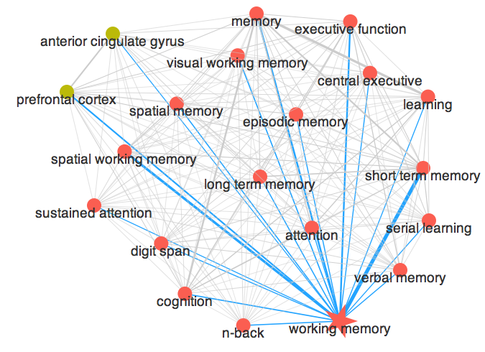Scientific Credentials
 i3 Mindware has been developed by cognitive neuroscientist Dr Mark Ashton. Smith. The software improves limitations of the proven Jaeggi n-back exercise and incorporates scientifically designed IQ puzzles that develop strategies for all factors of psychometric IQ.
i3 Mindware has been developed by cognitive neuroscientist Dr Mark Ashton. Smith. The software improves limitations of the proven Jaeggi n-back exercise and incorporates scientifically designed IQ puzzles that develop strategies for all factors of psychometric IQ.
Dr Mark A. Smith obtained a Ph.D in cognitive psychology and neuroscience from the joint Carnegie Mellon University and Pittsburgh University Center for the Neural Basis of Cognition (CNBC) program. Between 2000 and 2003 he was a Lecturer in the Experimental Psychology Department at the University of Cambridge, England. His research program and CV can be found here.
The Scientists Behind the Development of the N-Back Training Exercise
i3 Mindware is brain training software that builds on scientists’ theoretical understanding of working memory and the n-back training exercise that has been used by cognitive neuroscientists in laboratories for over a decade. The scientists most central to the the historical development of this training method are shown below. Note that these individuals were not directly involved in the development of i3 Mindware, and this is not an endorsement of the product on their part.
 .
.
.
.
.
Professor Alan Baddeley, FRS, CBE. Psychology. University of York. Developed our understanding of the multiple components of working memory.
.

.
.
Dr Susanne Jaeggi. University of Michigan. Lead the research project that demonstrated an intelligence gain from dual n-back training. Reference here.
.
 .
.
.
.
Dr Martin Buschkuehl. Research Fellow. University of Michigan. Member of research team who demonstrated an intelligence gain from dual n-back training.
.
.
Professor John Jonides, Psychology & Neuroscience, University of Michigan. Member of research team who demonstrated an intelligence gain from dual n-back training.
Your IQ level is not fixed
The consistency of an individual’s IQ scores over time has been interpreted as showing that IQ is stable over time. But evidence shows that intelligence (IQ) can change over time as a function of a person’s learning and life experiences (for reviews, see Flynn, 2000; Nisbett, 2009). This evidence is supported by research on neuroplasticity showing that the brain is highly plastic and changeable in its circuitry.
The science tells us there are two ways in which an individuals’ IQ can increase:
A Positive Feedback Loop
Children, students or employees who have initially higher IQs may be ‘streamed’ or find themselves in high IQ environments. This results in access to more resources, more stimulation, better instruction, which in term results in increases in IQ over time. This is called a positive feedback loop, and these loops can increase IQ level over time.
Shaywitz and colleagues (1995) have shown that a child with an IQ of 120 in first-grade will tend to have an IQ of 135 by fifth-grade; conversely, a child with an IQ of 80 in first grade will tend to have an IQ of 74 by fifth grade.
Brain Training – Rapid Neuroplasticity Change
In 2008, for the first time in over 40 years of research, a team of psychologists at the University of Bern in Switzerland and the University of Michigan in the USA, led by Dr. Susanne Jaeggi, demonstrated to the scientific community that a simple brain training exercise, practiced for 20-25 minutes each day for 20 days, could substantially improve both short term memory and intelligence.
Increasing intelligence is possible after all …with more training leading to greater gains …across the spectrum of abilities.
Robert Sternberg, Professor of Psychology
The only effective IQ increasing brain training in over 40 years of scientific research
It is only due to recent insights from cognitive psychology about the functioning of working memory – a short term memory system for processing information – that scientists have now developed an effective brain training exercise for increasing IQ and memory capacity.
Relationships between working memory and different cognitive functions and brain regions according to brainSCANr are shown below.
.
i3 Mindware brain training targets working memory capacity and function. The training has widespread effects across many cognitive functions – shown in the diagram to the left – because of central role of working memory in overall cognitive performance and intelligence.
Why is this ground-breaking science?
Historically this is the only known brain training exercise that has been scientifically demonstrated to improve intelligence.
Professor Robert Sternberg. the world’s leading authority on intelligence, has said of this brain training exercise:
Almost 40 years ago, Jensen claimed that, when all is said and done, there is not much one can do to raise people’s IQs. Jaeggi and her colleagues have made an important contribution… by showing that intelligence is trainable to a significant and meaningful degree.
Robert Sternberg, Professor of Psychology
Professor Sternberg’s published article on the i3 training exercise can be found by clicking here.
Why does i3 Mindware work?
i3 brain training software works by training and inducing neuroplasticity change in your working memory. Working memory is a short term memory system used to hold in mind a few items of information for a brief time and process this information in order to reason and solve problems while ignoring distracting information. There are different working memory stores for spatial and verbal information. We use working memory when we reason, plan and problem solve. It is our ‘mental workspace’.
The working memory-IQ link
People vary widely in their working memory capacity, and that these differences in fact predict general intelligence level as measured by standardized IQ tests. General intelligence depends on working memory because working memory affects a wide range of complex cognitive tasks besides figuring out a tip, involving reasoning problem solving, and making sense of things. We use working memory when we reason, plan and problem solve.
Working memory and general intelligence both share the same brain circuitry – part of the frontal cortex of the brain called the dorsolateral prefrontal cortex. (‘Dorsal’ means up, and ‘lateral’ means to the side – hence ‘dorsolateral’).
How to obtain an IQ increase? The logic
The logic is simple:
- If you can improve your working memory capacity by training it directly, you can increase your intelligence level indirectly.
- There is a ‘transfer effect’ from working memory training to intelligence and IQ.
This graph shows typical increases in working memory capacity (how many items of information you can hold in mind) as a result training with i3 Mindware.
How much does IQ increase from brain training?
In the Jaeggi study, the measure of IQ – a time-limited version of Raven’s Advanced Progressive Matrices – increased by over 40% in just 19 days. There was a training effect on IQ level for people of all starting intelligence levels. This graph shows the IQ gains over number of daily sessions.
This is an enormous effect, and has excited the entire scientific community.
Overcoming limitations of standard n-back training with 2G training
Traditional (e.g. Jaeggi) dual n-back training has a number of critical limitations including the following:
- Motivation. N-back training is hard and traditional n-back apps on the market have a high drop out rate because of this. i3 Mindware has built in motivators that ensure that you complete the program and reap the benefits to your IQ and brain function that would otherwise not be tapped. These include leaderboards, game-like sound effects, block by block customization and IQ increase and top-score guarantees.
- Game strategies. The original Jaeggi dual n-back and its variants on the market do not counter a number of strategies to maintain or improve n-back levels without associated gains in actual working memory capacity – such as chunking, attention blinking and playing the odds. i3′s 2G training helps counter these counter-productive strategies.
- Questionable IQ gains. With dual n-back training alone, the research is mixed as to whether an IQ gain automatically follows (although the other important cognitive benefits are not in question). A number of recent studies have challenged the Jaeggi study, showing that with certain populations (e.g. college students) n-back training does not result in an improved IQ – such as this one. i3′s ‘interference control‘ as well as it’s capacity-strategy method, hones in on precisely what results in IQ gains in n-back training.
For the science behind i3 Mindware’s innovative 2G+ brain training method, click here. Our software app provides both an exact replica of the Jaeggi (2008) n-back task, as well as this second generation brain training game.

Scientific References
- Jaeggi, S.M., Buschkuehl, M., Jonides, J., & Perrig, W.J. (2008). Improving Fluid Intelligence with Training on Working Memory, Proc Natl Acad Sci USA, 105: 6829–6833.
- Sternberg, R. J. (2008). Increasing fluid intelligence is possible after all. Proc Natl Acad Sci USA, 105, 19: 6791–6792.
- McNab, F., Varrone, A., Farde, L., Jucaite, A., Bystritsky, P., Forssberg, H., & Klingberg, T. (2009). Changes in Cortical Dopamine D1 Receptor Binding Associated with Cognitive Training, Science, 6, 323, 800 – 802.
The Scientific Press
Increasing intelligence is possible after all …with more training leading to greater gains …across the spectrum of abilities. …Almost 40 years ago, Jensen claimed that, when all is said and done, there is not much one can do to raise people’s IQs. Jaeggi and her colleagues have made an important contribution… by showing that intelligence is trainable to a significant and meaningful degree.
I know, there is a huge market of software concerning brain training, IQ-training, and so on. But there is no real scientific evidence that these programs actually work, that is, that they actually boost intelligence or train something else than the task itself, at least in young adults. The … fact that we reliably showed transfer effects after training, and moreover, that we showed transfer to such an important function as fluid intelligence is a very new and exciting finding in our field.
It it is possible that these exercises aid with nerve cell growth or nerve cell function in some way or alter neurological function in some way… The results are exciting and have implications for a wide variety of fields including alzheimer’s and other dementias.
Simple brain exercise can boost IQ
Can mental training improve your intelligence? No video game or mental puzzle has convincingly been shown to work. But now a group of neuropsychologists claims it has found a task that can add points to a person’s IQ – and the harder you train, they say, the more you gain.
Smarten up. Practicing a challenging memory task spurs a surprising intelligence gain
If you’re looking for an intellectual picker-upper that doesn’t come in a pill, remember this: A relatively brief memory-training program jump-starts general reasoning skills and problem-solving proficiency, according to a new study.

Training can increase fluid intelligence, once thought to be fixed at birth .
Can human beings rev up their intelligence quotients, or are they stuck with IQs set by their genes at birth? Until recently, nature seemed to be the clear winner over nurture. …But new research, led by Swiss postdoctoral fellows Susanne M. Jaeggi and Martin Buschkuehl, working at the University of Michigan in Ann Arbor, suggests that at least one aspect of a person’s IQ can be improved by training a certain type of memory.

Plastic brain outsmarts experts.
Crystallized intelligence draws on existing skills, knowledge and experiences to solve problems … Fluid intelligence draws on the ability to understand relationships between various concepts, independent of any previous knowledge or skills, to solve new problems. The research shows that this part of intelligence can be improved through memory training. …General intelligence is a key to determining life outcomes such as academic success, job performance and occupational advancement … Researchers also surmise that this same type of memory training may help children with developmental problems and older adults who face memory decline.






